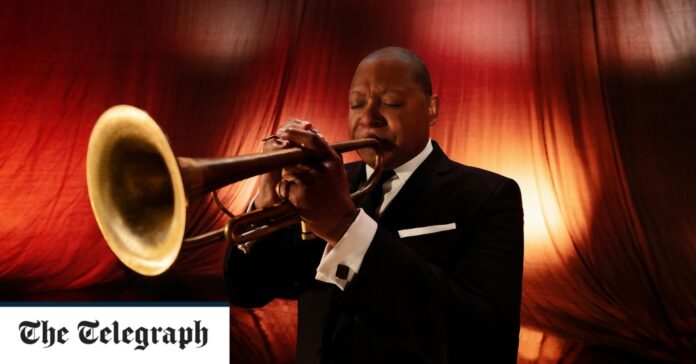Ahead of shows in London and Europe, the world-beating trumpeter and band leader explains why he’s still learning from the greats
It can be a burden, wearing the mantle of the great Jazz Tradition. It’s a mantle Wynton Marsalis has taken on willingly for the past four decades, tirelessly promoting jazz as something worthy to stand beside any other form of music. He’s achieved this through his own recordings as a trumpeter and band-leader, through leading the Lincoln Centre Jazz Orchestra since 1996 and running a huge jazz education programme in thousands of schools across the US, and in recent years through his own large-scale compositions such as Blood on the Fields and the recent violin and trumpet concertos.
But it may be the simple weariness of being on tour with the JLCO that makes him less than his usual enthused energised self when I speak to him via Zoom in his surprisingly modest hotel room somewhere in France. When I ask him what he and the band are playing he finds it hard to sum up, because the real answer is “everything”.
“We try to show that all jazz music is contemporary, no matter what period it comes from. So we’ll play some original pieces of mine and other band members like the horn (saxophone) player Sherman Irby, trombonist Chris Crenshaw, but we have also music by Dave Brubeck, by Dizzy (Gillespie) by Duke (Ellington) also a piece by Wayne Shorter who passed away this year. So we honour our forebears, but because our music is also improvised we’re fulfilling their wishes in another way, because improvisation was at the heart of what they did, and what we do.”
It’s not just jazz Marsalis has excelled in. He seized the attention of the classical world back in the 1980s with spellbindingly virtuoso recordings of Haydn’s trumpet concerto and Bach’s 2nd Brandenburg Concerto. When I ask him why he turned his back on that he shrugs and says, “Yeah I would like to have done more of that, but you need to put all your time into that, if you want to keep your integrity. And I decided I wanted to be a jazz musician, which is a lifetime’s work. But it’s still part of me as a musician, because it’s part of what formed me. You know in New Orleans where I grew up there were so many different kinds of music.


